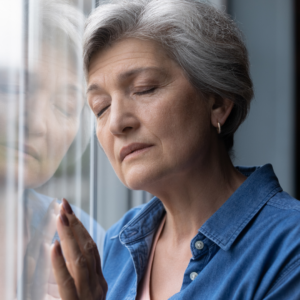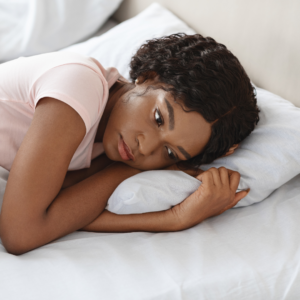Depression In Women: Signs, Symptoms, and Why You Need Therapy
It’s not uncommon to experience emotional ups and downs. And as a woman, regular hormonal shifts often add to them. While feeling sad from time to time is a regular part of life, suffering from depression is something completely different.
According to many experts, women are approximately twice as likely to experience clinical depression. The gender differences between male and female depression have been widely documented. They have revealed that the risk for women experiencing major depression is higher, independent of ethnicity and race.
The vital thing you must understand is that depression is not your fault. It’s not a decision you make, and it’s nothing to shrug off. Depression in women is a very real, diagnosable medical condition requiring attention from a trusted, compassionate mental health professional.
Risk Factors for Depression in Women
A comprehensive 2017 study revealed that the gender differences surrounding male and female depression typically begin around age 12. Several risk factors affect girls and women compared to men.
Hormonal Factors
As a woman, you experience many hormonal changes throughout your lifetime. While men also have hormonal fluctuations, they are far less impactful on mental health than those you go through.
- Puberty – The onset of puberty can increase the risk of younger females developing depression, although it’s not an inevitable risk.
- PMDD – While many women experience premenstrual syndrome (PMS), others face a more severe medical condition called premenstrual dysphoric disorder, or PMDD, which is a type of depression typically requiring professional treatment.
- Pregnancy-related mental illness – Pregnancy is full of ever-changing hormones. Sometimes these hormone changes can contribute to pregnancy-related mental illness. Not all women will experience perinatal or postpartum depression or anxiety, but 10-20% will.
- Perimenopause and menopause – Your risk of developing female depression may increase during one of your body’s most significant life transitions: menopause. Decreased estrogen levels are typically to blame.
Cultural Factors
Unfortunately, while things are slowly evolving, it’s a well-known fact that men and women aren’t always treated equally in all cultures, even in North America. The societal expectations, gender roles, and cultural norms put on us as women can easily contribute to depression in women.
Discrimination, gender inequality, and the balancing of way-too-many roles is no doubt a common contributor. Trying to balance work, family, caregiving, and more can be very challenging, stressful, and draining. It’s no wonder more women experience depression than men.
Genetic Factors
There’s no denying your genetic makeup significantly impacts whether you may develop female depression. Like any other illness, mental illness can run in families. Having a family history of depression or other mood disorders increases the risk of depression in women.
Body Image and Self-Esteem Factors
In the age of social media, photoshop, and seemingly “perfect-looking” celebrities in Hollywood, as a woman, you face a constant barrage of what society deems as “beauty.” When you don’t fit within these unattainable standards of beauty, or you don’t think you do, it can damage your self-esteem and cause negative body image concerns. And when you struggle in these areas, you’re more at risk for dealing with depression.
It’s important to note that while these risk factors may increase your likelihood of developing depression, they don’t guarantee it. Depression in women is highly complex and depends on a number of individual factors. But if you believe you may be dealing with this common mood disorder, there’s no shame in reaching out for support.
Signs and Symptoms of Depression
No two women’s journeys through life are alike. The complex combination of what brings you to depression is as unique as you are. The same goes for your female depression symptoms. However, there are a number of common signs and symptoms you should be aware of.
These include the following:
- persistent overwhelming sadness, hopelessness, and despair
- loss of interest in activities and hobbies you once enjoyed (including sex)
- irritability, guilt, anxiousness, and extreme mood swings
- changes in appetite and eating patterns leading to significant weight loss or gain
- overwhelming tiredness, fatigue, and loss of motivation or energy
- inability to concentrate, make decisions, or remember things
- physical symptoms like digestion problems and headaches
- changes in sleeping habits like insomnia, oversleeping, or inability to stay asleep
- experiencing panic attacks
There are also additional signs of depression in women you may not recognize as symptoms, including the following:
- heightened self-criticism
- mental fog
- trouble with managing money – overspending or spending a significant amount of time thinking about it
- body aches and pains
- dry skin and eyes due to hormonal changes
- diarrhea or constipation
- social withdrawal
- agitation and restlessness
Women’s Counseling in California and Ontario
The Importance of Therapy for Women
One of the most crucial things you can do for your mental health and well-being, especially when dealing with depression, is to partner with a trusted therapist. Therapy for women plays a critical role in helping you through your struggles.
With the right therapist by your side, you’ll not only receive an accurate assessment of your mental health concerns, but you’ll also receive the emotional support you need. Sometimes as women, finding someone you can confide in without fear of judgment can be challenging. If you’re dealing with depression, you may feel isolated. This is where women’s counseling comes in. A compassionate, trusted therapist can help you feel less alone, validated, and understood.
How I Can Help
When you partner with me for women’s counseling in California and Ontario, you’ll gain an ally who’ll stay by your side throughout your journey and beyond.
Therapy for women is a passion of mine. I believe you have the power within yourself to make the necessary changes you need to make to live a happy and fulfilling life. My extensive experience in the women’s health field and straightforward, honest, compassionate, and evidence-based approach to therapy is one you can count on.
Whether you are struggling with depression or dealing with past hurts or traumas, mental health concerns negatively impact your everyday life.
But they don’t have to. You have the capacity for change. And I can help you discover it.








